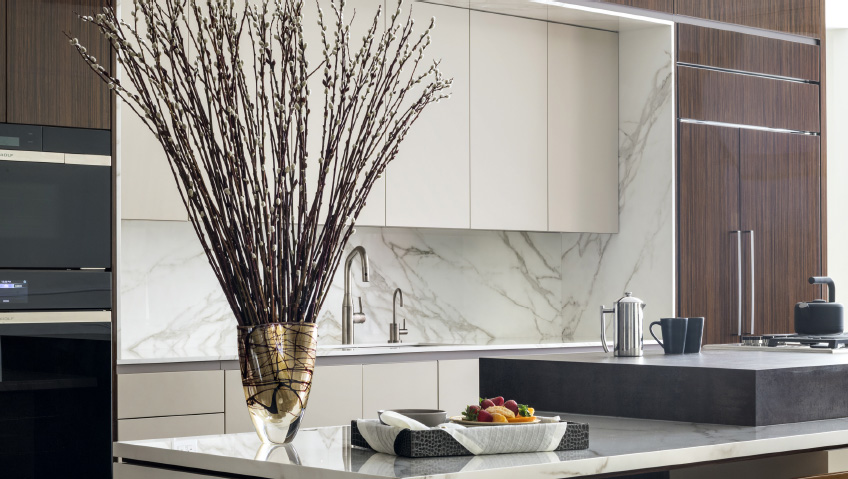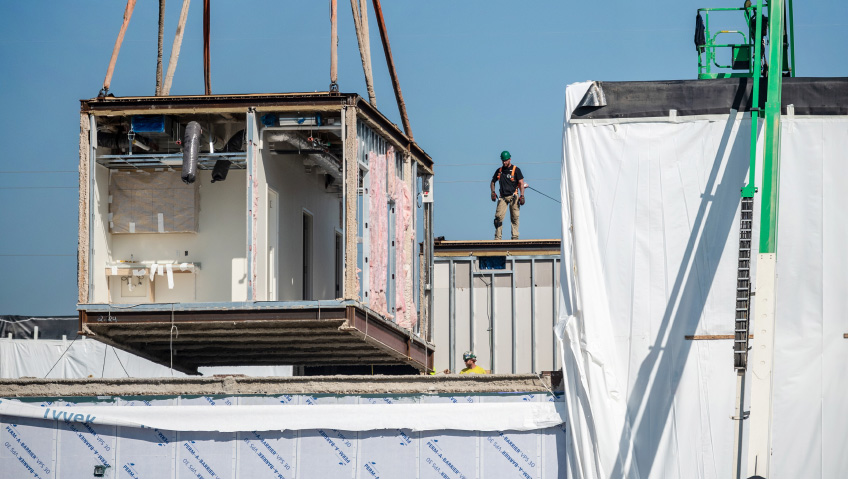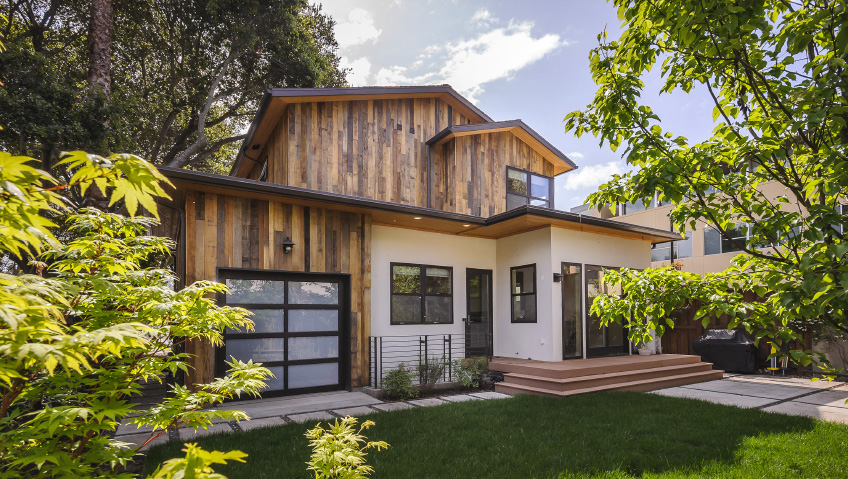At Craft-Maid Handmade Cabinetry in Reading, Pennsylvania, solid craftsmanship is precisely what this team of traditional artisans delivers. In a world filled with mass-produced, imported furniture, there is much to be said for time-honored, authentic artisanal cabinetry that weathers as well as it works.
The company’s modern and traditional design and carpentry stand head and shoulders above the competition—just ask any of its loyal, returning customers, who appreciate owning a kitchen, bathroom, or closet with grain-aligned cabinet doors, perfectly blended fillers and edge bands, and sleek interior finishes. The company’s work is so sought-after by people who value how quality enhances any living space that customers who sell their properties regularly call the Craft-Maid team to recreate their old kitchens in their new homes—a tremendous compliment if ever there was one.
With its name wood-branded inside every drawer, visitors who fall in love with the company’s work at friends’ homes always know where to find its craftspeople. In addition to direct service, Craft-Maid Handmade Cabinetry also has a pool of dealer-designers serving architects and other construction professionals.
“It’s the details that make a kitchen spectacular. Our cabinets are furniture; that means they are the highest quality,” says Vice President Of Operations Phil Lipschultz, speaking of the wide selection of wood varieties and finishes available. After 30 years, his passion for this work is as evident as ever. “I always ask whether people plan to do this again in five or ten years, and the answer is always no. That’s why you need higher quality cabinetry.”
Production Manager David Kerschner tells us that white oak is trending in a big way, and after more than 20 years at the company, he knows the market well. As does the company’s expert team of 55 dedicated employees. “Everybody here is skilled… They’re also cross-trained. No matter how big or small the task sounds, they’re all very valuable in what they do,” he says.
The team’s commitment to excellence makes the company proud. Their dedication shows in their work—especially in the skills that go into their stunning, traditionally dovetail-joined drawers. “In my opinion, our drawers are the best in the industry,” Kerschner adds with a smile.
As well as white oak, many homeowners are also enjoying the modern look of stained wood combined with painted elements. Whether customers are searching for simplicity or lively wood grain to lend texture and warmth to the hearts of their homes, the team can supply. While its finish styles may have become more simplified over time, the company is as happy to ensure good, hand-done artisanal finishes as it was back when its standard treatments sometimes involved up to fifteen processes. For this reason, its staff members are well-trained and experienced in their craft. With this acute attention to detail, customers can know that what they sign off on in sample form is what they will get when the project is complete.
The company was originally founded by Stuart Zager in 1969. After its successful beginning as a local kitchen cabinet contractor, its goal became to grow into a national high-end kitchen cabinet manufacturer. Jerry Goldberg, who had been working for an international company based in New York City, became interested in joining Craft-Maid and growing the company. By 1974, Jerry joined the company as Vice President and an equal partner. Stuart, as the “inside manager,” engineer and production supervisor, and Jerry as the National Sales Manager, began to grow the company into the respected company it has become today.
Today, any challenges are still met with creativity, with the result that problem solving is a key part of Craft-Maid’s offering. One time, its fast-thinking team had to pass a tall kitchen cabinet from one balcony to another, 35 stories off the ground, to get the unit to its destination. Following that event, the team decided to come up with a way of preventing further delivery surprises. “We have a questionnaire for delivery conditions so that we can anticipate delivery challenges, and every time you come into a situation that you can’t possibly anticipate, you learn. Then you tweak your questions,” says Lipschultz.
During COVID’s initial two-month forced closure, the team set out to handle existing projects from home but also used the time to set its planning and design on a new trajectory. While its agents had their hands full with cabinetmakers from other states trying to establish market share in the region, business remained excellent.
“It is a testimony to our relationship with our dealers. They were not interested in employing other cabinetmakers. We are very proud of that,” says Lipschultz of the loyalty and longevity of the company’s relationships with its partners. Some of its oldest customers include Connecticut’s Form LTD, Townhouse Kitchens in Manhattan, and Jim Dove Design in Florida.
As it maintains the quality of its design and craftsmanship, the company also ensures that its machinery remains modern and up-to-date. To this end, Craft-Maid, over the years, has designed and built many custom-made machines for specific operations and efficiencies, and has recently invested in five new major machines, giving its output and capabilities a generous boost. In addition, Craft-Maid acquired a specialized piece of equipment that supports cutting oversized components like doors from single sheets of engineered fiberboard for projects where high-performance demands may render items made from joined wood panels insufficient in long-term strength.
“Our project managers review jobs submitted to us by our dealer-designers. We review a job, detail-wise, more thoroughly than any other cabinet company by light years,” says Lipschultz, pointing out the importance of catching errors and miscalculations before production starts.
Craft-Maid is not only focused on fabrication excellence; it also does its part to prevent waste. Part of this effort sees its sundry materials like wood dust and scraps shipped off to others who can apply them in their operations—like sawdust used for sopping up oil spills.
As with most industries, Craft-Maid sees a significant evolution in market demand as requests shift from orders for only kitchens to contracts for the cabinetry of entire homes, including offices, bathrooms, and storage. The team ascribes this shift to the home-office trend brought about by the pandemic and to customers growing more discerning. “With people being at home, the amount of research they can do is very intense,” says Lipschultz, “and customers won’t hesitate to make a change.”
Seeing quality cabinetry as an investment, many customers do not mind paying—and taking the time—to get exactly what they want. To respond to this shift successfully has meant becoming flexible and ready to handle sudden changes seamlessly—a crucial skill at which Craft-Maid excels.
It is this kind of personal attention that has led Craft-Maid to such success over the years. Looking ahead to creating an even brighter future, continuous improvement, growth, and evolution are all spurring the company’s goal of a 50 percent expansion over the next three to five years. We have no doubt this goal will come to fruition.






